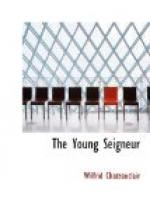THE COURSE OF TRUE LOVE.
“Proneurs de l’ancien regime, dites-moi ce que vous faites de ces belles et riches natures de femmes, qui sortent du sang genereux du peuple?”
—ETIENNE PARENT.
During the excitement and bustle, Mr. Chrysler also sometimes fell into the modest society of Josephte. The girl seemed sad at these times, and to be losing the serene peace which at first seemed her characteristic. He remarked this to Madame Bois-Hebert one day as he met her sitting in the shades of the pine-walk reading a devotional work.
Madame was a figure still able to command as well as to attract respect. Dignity and ability had not yet departed from her face and bearing, and quietude was the only effect of age upon her, beyond falling cheeks and increasing absorption in exercises of religion.
“Does it not appear to you that your demoiselle is sad?” he asked.
“It is true, monsieur; her mind is troubled at present.”
“The cause is some cavalier.”
“You judge correctly. Benoit does not wish her to marry as she desires. And though he wishes her to unite herself to a brute compared with her cavalier, yet the latter is himself an individual of no consequence, and she has been well advised to relinquish him.”
“Who is it advises that?”
“Her friends, who see in her a more lovely destiny. The dear child will make perhaps a Saint. You do not know the expiations and indulgences she has earned these several years by prayers and devotions, her pure nature, her admirable conduct. She is not for the world, but for God.”
“What did Josepthe herself think?”
That which Madame had said of her nature was correct enough. She was a delight to the sisters in their sad, austere lives. “She is like an angel, and has the movements of one,” they said. Very unlike to, for instance, the daughters Jalbert, those bold and idle girls, whose steady occupation was tom-boying scandalously with chance young men, and jeering impudent jeers at everybody.
Her haunts were in removed and shady nooks, such as the little dell behind the log cabin of the Le Bruns. There, one hot afternoon he found her sitting under the shade of the windmill, dressed as usual in neat black, and as usual lately, pale. The little ones ran, sat and played around her; Henri, Rudolphe and Elisa in the pride of their enterprise tugging the long beam by which horse or man in the preceding century had turned the conical cap of the mill; their efforts cracking and shaking the crazy roof, but availing nothing except to disturb a crow or two near by, among the white birches through whose clusters gleamed the River in the sun.
What brought Josephte to the Le Brun dell?
Et quoi! She was weeping.
Those little children saw not her silent tears. Chrysler beheld them—crystalline drops on pale, soft cheek, emblems of pure heart and secret sorrow; but she checked them when he drew near and sat up composed.




